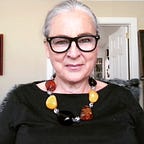The talented Erika Mann
Thomas Mann’s Daughter deserves some recognition
Her famous father’s literary genius was celebrated, making him a Nobel Prize winner. But she, the oldest daughter of Thomas Mann, can be credited with actively involving herself in significant social and political issues of her time, the turbulent first half of the 20th century, a time that saw the rise of the Nazi regime in Germany, which led to the disaster of WWII and its terrible aftermath. Her literary contribution might not have been lines of beautifully told stories along her father’s writing, but her contribution is invaluable and, unfortunately, almost forgotten today.
During her varied, fascinating life, she was many things. As an actress, she was involved in avant-garde theatre productions. As a travel writer, she published her accounts. For the BBC, she worked as a war reporter. As executor, she was responsible for her father’s and brother’s literary estates. Like her older brother Klaus Mann, she was gay. A live long women’s rights advocate, she was also an outspoken critic of the Nazis, which landed her in trouble early on.
In 1935, it became clear that the Nazis intended to strip Mann of her German citizenship, just like her uncle Heinrich Mann, another writer famous in Germany. His novel Professor Unrat was the basis of the movie that made Marlene Dietrich famous. He was the first to be stripped of German citizenship when the Nazis took office. Erika Mann asked Christopher Isherwood (notable because of the musical Cabaret) if he would marry her so that she could get a British passport. He declined but suggested she approach the gay poet Auden who married her in 1935. Mann and Auden never lived together but remained on good terms throughout their lives and were still married when Mann died; she left him a small bequest in her will. In 1936, Auden introduced Therese Giehse, Mann’s lover, to the writer John Hampson to get married so that Giehse could also leave Germany. In 1937, Mann moved to New York, where her theatre company Die Pfeffermühle renamed The Peppermill opened its doors again after having been closed in Switzerland. There Erika Mann lived with Therese Giehse, her brother Klaus, in a large group of artists in exile that included Kurt Weill (famous for the Three Penny Opera),
Her most influential book was: School for Barbarians: Education under the Nazis. Originally published in the United States in 1938, one year before the outbreak of the war, it sold forty thousand copies in the first three months. The same year, it was also published in the Netherlands. Erika Mann gave the American and European public an early view of how the Nazis were transforming a whole generation of Germans by hijacking the education of the almost ten million children entrusted to them. It is a comprehensive, carefully researched description of the physical and emotional enslavement of children and the gagging of their parents. When Mann published her book, the destruction of the political opposition
Had Mann’s book been published in Germany in 1938, it would have been a one-way ticket to a concentration camp or work camp. A first German edition was finally published in 1986 under the somewhat less provocative title Ten Million Children: The Education of the Youth in the Third Reich. Mann’s book appears carefully researched, but some of her quotes sounded so bizarre by today’s standards that it seemed as if she had overstated the facts. Her 1986 German publisher must have felt the same way and obliged her readers by adding a whole fact-checking chapter confirming that her research was legitimate and that she had quoted her sources accurately. The book gave a graphic impression of how German children lived at the time. It was a dire warning to the world of what was to come, but it went unheard despite her father’s endorsement of the book in an introduction.
During WWII, Mann worked as a journalist in London, making radio broadcasts, and became a war correspondent attached to the Allied forces advancing across Europe. She reported from battlefields in France, Belgium, and the Netherlands. She went to Germany in June 1945. As soon as possible, she went to Munich to register a claim for the return of the Mann family home. Her grandparents’ country house in Feldafing would be part of the former Nazi elite School Feldafing. When she arrived in Berlin, she was shocked at the level of destruction, which made her angry at the lack of guilt displayed by some of the German civilians and officials she met.
Mann attended the Nuremberg trials. In May 1946, she left Germany for Los Angeles to help look after her father, who was being treated for lung cancer.
From America, Mann continued to write about the situation in Germany. She was angry at the slow pace of de-nazification. She objected to the lenient treatment of cultural figures who had stayed in Germany throughout the Nazi period. Unfortunately, her views led to her being branded a Communist in America. Both she and her brother Klaus came under an FBI investigation because of their political views and being gay. In 1949 Klaus Mann committed suicide. The event devastated his sister. In 1952, due to the anti-communist and other accusations from the HUCA — the House Committee on Un-American Activities, in the age of McCarthyism, the Mann family left the US. Mann moved back to Switzerland with her parents. It seemed ironic that after she left Germany to escape persecution for her forward-thinking ideas, she was again targeted in her new home country. There she helped her father with his writing and became one of his closest confidantes. After the deaths of her father and her brother Klaus, Erika Mann became responsible for their work. Mann died in Zürich on 27 August 1969 and is buried next to her parents. She was 63. For all her critical, influential writing, she has become virtually forgotten today.
